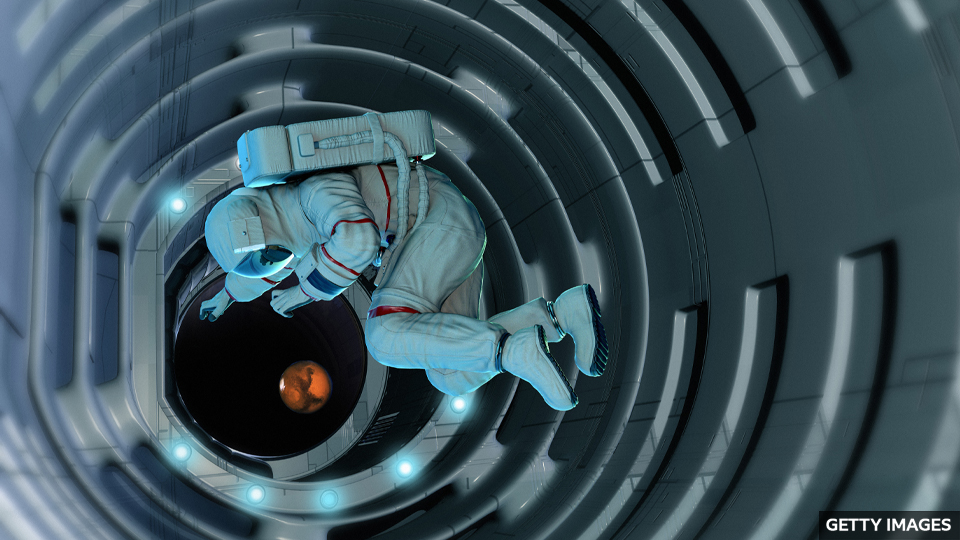随身英语
Health in space太空旅行对健康的影响

太空旅行让人体处在极端的环境中,这对人的身体和心理健康都有可能造成伤害。本期 “随身英语” 介绍宇航员在太空中可能遇到的健康问题,并讨论关注宇航员的健康对航空事业和医疗科学发展的意义。
词汇:space travel 太空旅行
Astronaut Frank Rubiales has returned to Earth after 371 days in space. It was only supposed to be 180, but a technical fault stopped him from returning as planned. Unlucky for him, but very lucky for scientists who want to see what effects spending an extended time in space has on the human body.
Being in space can affect both physical and mental health. Weightlessness caused by a lack of gravity can lead to a loss of bone and muscle mass. Astronauts are recommended 150 minutes of exercise per day to counteract this. Also, space traveller's eyes can be affected by the way that fluids act in zero-gravity. Outside the protection of the Earth's atmosphere, astronauts are exposed to much higher levels and different forms of solar radiation. This can potentially cause long-term health problems, such as cancer.
It's not just physical health that is affected by being in space. Our mental health can be damaged if we don't get enough sleep. On earth, our bodies respond through circadian rhythms to the Sun rising and setting to help us sleep, but astronauts on board the International Space Station see 16 sunsets and sunrises every day. This means that avoiding sleep deprivation is a challenge. Isolation, and spending all your time with a small group of people can also affect mental health. Along with isolation, is the pressure that comes from being constantly monitored by experts back on Earth. With possible future missions to Mars predicted to last three years, tensions within the crew could become heightened. Astronaut Harry Hartfield reports an example of this where a colleague threatened to open the airlock and drain the oxygen from the spacecraft.
Developing new techniques and technology to support astronauts' health will enable more ambitious future missions. It can also help those of us who are staying on Earth. The Canadian Space Agency is using its expertise to improve health care for people living in remote regions. The technology that supports robots used in space is now being used in surgery in normal hospitals, while pressure suits are being used to treat post-pregnancy complications.
词汇表
astronaut 宇航员
technical fault 技术故障
physical health 身体健康
mental health 心理健康
weightlessness 失重状态
lack of gravity 失重
muscle mass 肌肉量
exposed to 使…暴露于
solar radiation 太阳辐射
cancer 癌症
circadian rhythm 昼夜节律
International Space Station 国际空间站
sleep deprivation 睡眠不足
isolation 与世隔绝
monitored 被监测
tension 紧张关系,人际矛盾
airlock 气闸舱
spacecraft 宇宙飞船
pressure suit 加压服
post-pregnancy complication 产后并发症
测验与练习
阅读课文并回答问题。
1.How long was Frank Rubiales' mission originally planned to be?
2.Why was the technical fault lucky for scientists?
3.How much exercise should astronauts do per day?
4.How many sunrises does an astronaut see every day on the International Space Station?
5.What equipment from space missions is now being used in healthcare on Earth?
选择意思恰当的单词或词组来完成下列句子。
1.Oh no! The computer has developed a _______.
lack of gravity technical fault monitor tension
2._______ help our body regulate sleep patterns.
Sleep deprivations Isolations Circadian rhythms Weightlessness
3.Astronauts are often _______ to dangerous situations.
monitored deprived pressured exposed
4.The _______ keeps oxygen on board the spacecraft.
airlock technical fault pressure suit monitor
5.Exercise can help build _______.
circadian rhythm isolation muscle mass weightlessness
答案
阅读课文并回答问题。
1.How long was Frank Rubiales' mission originally planned to be?
It was supposed to last 180 days.
2.Why was the technical fault lucky for scientists?
Because they could learn about the effects of spending a long time in space.
3.How much exercise should astronauts do per day?
They are recommended 150 minutes of exercise per day.
4.How many sunrises does an astronaut see every day on the International Space Station?
An astronaut sees 16 sunsets and sunrises every day on the International Space Station.
5.What equipment from space missions is now being used in healthcare on Earth?
Pressure suits are being used to treat post-pregnancy complications.
选择意思恰当的单词或词组来完成下列句子。
1.Oh no! The computer has developed a technical fault.
2.Circadian rhythms help our body regulate sleep patterns.
3.Astronauts are often exposed to dangerous situations.
4.The airlock keeps oxygen on board the spacecraft.
5.Exercise can help build muscle mass.



